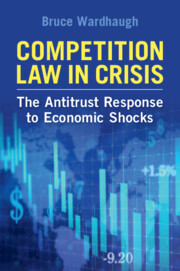Book contents
- Competition Law in Crisis
- Competition Law in Crisis
- Copyright page
- Dedication
- Contents
- Preface
- Acknowledgements
- Table of Authorities
- Introduction
- 1 The Legal Framework
- 2 The Pre–More Economic Approach to Competition’s Role in Crisis Management
- 3 The Post-MEA Relationship between Competition Law and Crisis Management
- 4 The Financial Crisis of 2008
- 5 The Covid-19 Crisis
- 6 Brexit
- 7 The Environment, Sustainability Goals and the Climate Crisis
- Conclusion
- Bibliography
- Index
2 - The Pre–More Economic Approach to Competition’s Role in Crisis Management
Published online by Cambridge University Press: 04 August 2022
- Competition Law in Crisis
- Competition Law in Crisis
- Copyright page
- Dedication
- Contents
- Preface
- Acknowledgements
- Table of Authorities
- Introduction
- 1 The Legal Framework
- 2 The Pre–More Economic Approach to Competition’s Role in Crisis Management
- 3 The Post-MEA Relationship between Competition Law and Crisis Management
- 4 The Financial Crisis of 2008
- 5 The Covid-19 Crisis
- 6 Brexit
- 7 The Environment, Sustainability Goals and the Climate Crisis
- Conclusion
- Bibliography
- Index
Summary
Past practice (in both the EU and UK) took into account non-economic considerations in assessing agreements among competitors and mergers – particularly in times of economic crisis. This included a wide scope for collaboration among competitors and (in the UK) extensive scope for the use of public policy considerations to otherwise override the judgment of merger control authorities. This chapter suggests that although the various regimes previously relaxed competition law in the face of crises, this was a mistake. It examines Depression-era responses (including the US experience) and modern cases (e.g. Synthetic Fibres, the oil crisis and early views on the environment and sustainability) to illustrate the argument. This chapter examines the 1980s and 1990s crisis cartels and other responses to industrial downturn. In the cases of crisis cartels, the competition authorities interpreted the rules to permit industry-wide downsizing plans that alleviated some of the socio-economic consequences of plant closures (e.g. sudden increases in unemployment) notwithstanding that such agreements involved agreed upon output restrictions – a typical manifestation of a cartel.
- Type
- Chapter
- Information
- Competition Law in CrisisThe Antitrust Response to Economic Shocks, pp. 34 - 65Publisher: Cambridge University PressPrint publication year: 2022

